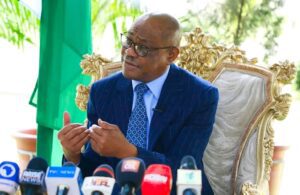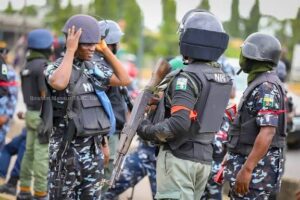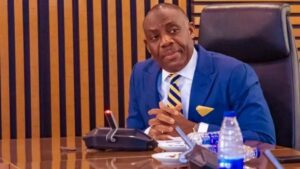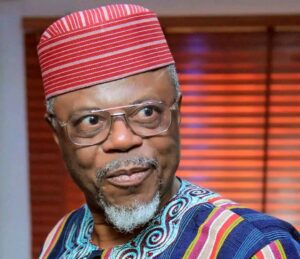World Bank Loan: Soludo’s Error Of Judgment

I will begin this contribution by thanking our Governor in Anambra State, Professor Charles Soludo for asking Anambra people in Lagos State to think home and bring part of their investments in the commercial capital of Nigeria back home. Indeed, I share his opinion that bringing investments home would transform our homeland into a place that other Nigerians and even foreigners would envy. The former governor of the Central Bank of Nigeria made this appeal recently while launching the “Anambra Homeland Consciousness Initiative” at Villa Park, Amuwo Odofin, Lagos.
He used the opportunity to recount the achievements of his administration in Anambra State in less than three years, including the rehabilitation of 400km of road, flagging off of 700km, the building of a flyover-bridge at Ekwulobia intersection to two federal highways, completion of abandoned projects, and renovation of public buildings, among others. Soludo said people had been asking him the “common question” where he got the money to do all those things.
He explained that his administration had refused to borrow one kobo since its inception on March 17, 2022. He assured them of the readiness of his administration to account for every money that had accrued to the state under him and say where it was put.
Governor Soludo restated that Anambra was the only state that pulled out of the sharing of an existing World Bank loan last year when states shared N436bn. Soludo said he saw the conditions for the loan signed before he came into office, felt they were not good for his state, and decided to pull the State out of it. He did not provide further information regarding the conditions of the loan.
The recent event in Lagos was the second occasion in about seven months that Governor Soludo talked about pulling Anambra State out of the existing World Bank loan. I heard it for the first time in August last year while watching a short video posted on the Facebook page of the Anambra State New Media. The video was titled “Listen to Gov. Soludo talk about the World Bank NG-Cares loan to 35 states in Nigeria”.
I did not hesitate to listen carefully. Among other comments, Soludo said: “I promise you and we are keeping to our words. Every penny that you put in our hands, we will show you where we put it. You may have seen recently a publication of a World Bank loan that came to about 35 states. The only state missing there is probably Anambra State. One day, I will explain why I mean (sic) about N435bn needed to be disbursed. The only state missing was Anambra and one day I will explain to you why we refused to take that loan.”
I was a bit confused after listening to the governor on that first occasion. I asked myself, “Why would the other 35 states partake in the disbursement of the loan and only Anambra State opted not to take the loan?” Regardless, I decided not to comment at that time since the governor promised to explain one day why he refused to take the loan. Seven months later, I did not hear any explanation from the governor until the recent event in Lagos, where he brought up the matter again. The only new thing added this time around was that he felt the conditions were not good and decided to pull Anambra State out of it.
Again, I asked myself, “If the other 35 states could cope with the conditions of the loan, why can’t Anambra State?” One governor cannot be wiser than 35 governors. I say this with utmost respect to Governor Soludo, knowing full well his background as a Professor of Economics and antecedents as a consultant to the World Bank, former chief economic adviser to the President, CBN governor and de facto Minister of National Planning.
Let us recall also that Soludo was a member of the Economic Advisory Council when the Federal Government designed the NG-Cares Programme under its Economic Sustainability Plan, coordinated under the office of then-Vice President, Professor Yemi Osinbajo. The Federal Government sought and obtained a $750m credit facility from the World Bank to support the 36 states in the implementation of the programme.
For those who may not know the meaning of NG-Cares, it is the COVID-19 Action Recovery and Economic Stimulus Programme for Nigeria. The programme was aimed at mitigating the economic and social shocks faced by poor and vulnerable Nigerians because of the lockdowns and shutdowns during the COVID-19 pandemic crisis. The key objectives include restoring the livelihood of these poor and vulnerable, maintaining food security and facilitating the recovery of medium and small enterprises.
So, if the conditions of the loan were that bad, why did Prof. Soludo, a member of the EAC, not advise the Federal Government against obtaining the facility from the World Bank? Why did he wait until he became the Governor of Anambra State to reject the loan to the detriment of millions of poor and vulnerable people in Anambra State, who would have benefitted from the loan?
It is even worse that the same poor and vulnerable people in Anambra State who were deprived of the benefits of the NG-Cares for reasons best known to Governor Soludo are today being subjected to multiple taxation by his administration in a desperate bid to shore up the revenue generated internally in the state. Even when they have not committed any offence, the poor and vulnerable in Anambra State have been put in double jeopardy. Some of them have sustained life-threatening injuries in the hands of Soludo’s boys for not paying one levy or the other. This should not be.
The COVID-19 pandemic occurred globally; Nigeria inclusive. The lockdowns and shutdowns affected the poor and vulnerable in every part of Nigeria, including Anambra State. I do not see why Anambra State should not partake in the disbursement of the World Bank loan meant for the 36 states of the Federation. I think it is an error of judgment for Soludo to pull the state out of the disbursement of the loan.
His counterpart in Enugu State, Peter Mba, is partnering with NG-Cares to reduce poverty in his state. In September, Mba announced that his government had embarked on the distribution of agricultural inputs, assets and grants worth over N4.6bn to farmers, communities and start-ups in Enugu State.





